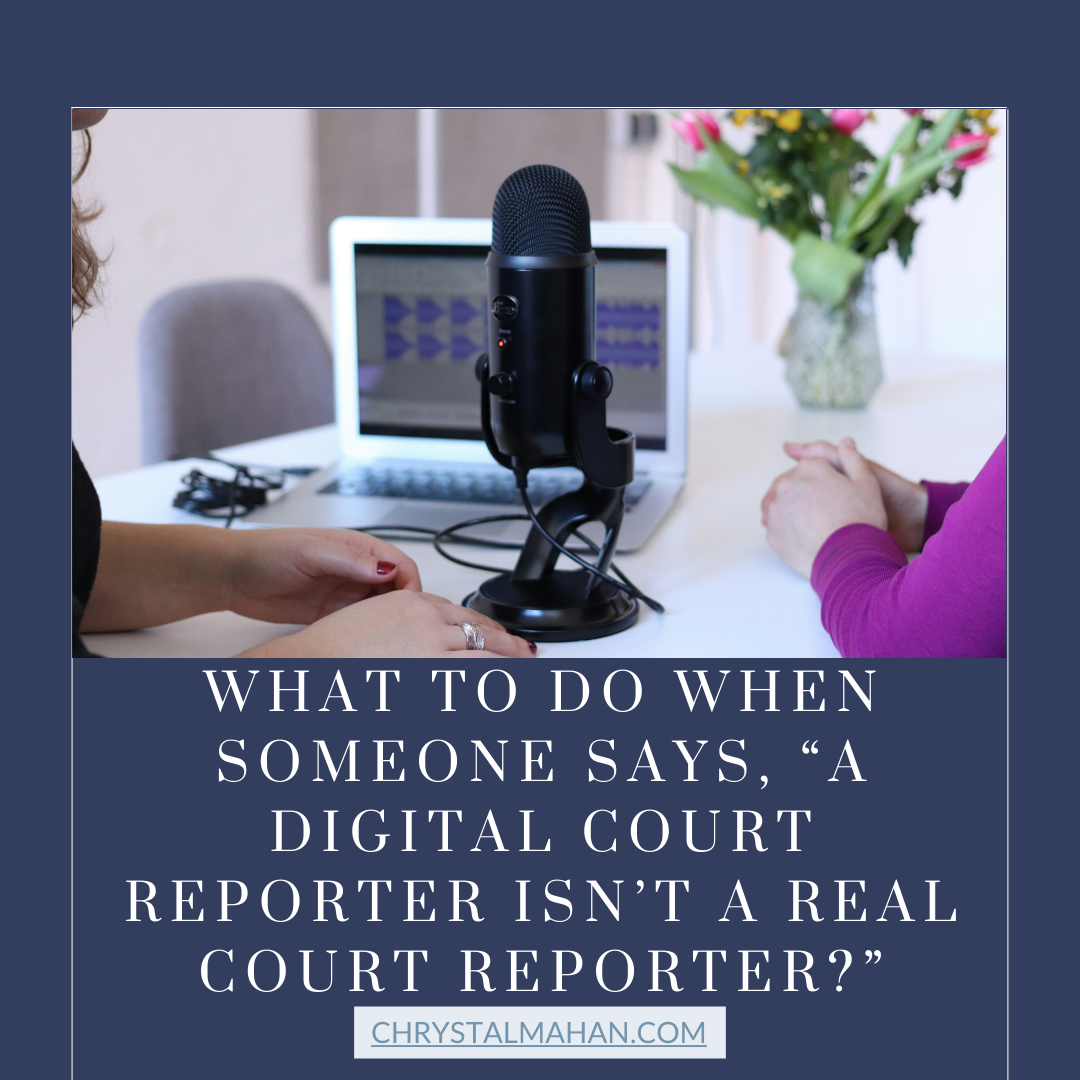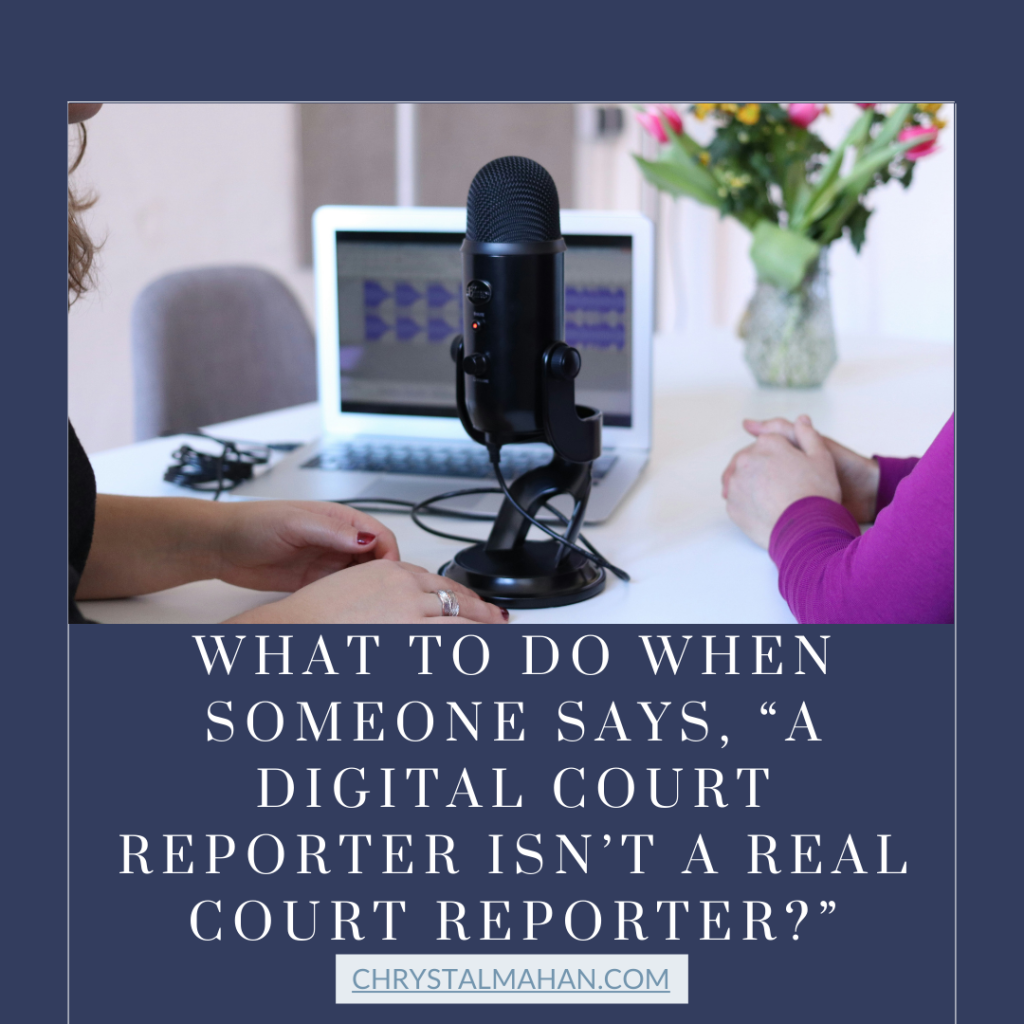What To Do When Someone Says, “A Digital Court Reporter Isn’t a Real Court Reporter?”


Technology has become an indispensable ally in the ever-evolving landscape of legal proceedings. One such technological advancement is the digital court reporter. However, despite its efficiency and accuracy, skeptics still question its legitimacy. If you find yourself defending the role of a digital court reporter, here’s how to navigate the conversation and advocate for this essential profession.
1. Educate and Inform
When faced with skepticism, take a deep breath and remember that knowledge is your greatest weapon. Begin by explaining what a digital court reporter does. Unlike traditional stenographers who use shorthand, digital court reporters capture proceedings using specialized software and high-quality audio equipment. They meticulously transcribe spoken words into written records, ensuring an accurate and verbatim account of court proceedings.
Emphasize the Benefits of Digital Court Reporting
#1 Efficiency and Accuracy
- Easy Transcript Searching: Digital court reporters can swiftly search for keywords or phrases within transcripts, saving time for attorneys and judges.
- Improved Accuracy: Digital records are less prone to errors caused by human fatigue or misinterpretation, ensuring a more reliable record of proceedings.
#2. Cost-Efficiency and Streamlined Processes
- Reduced Turnaround Time: Digital transcripts are produced faster than traditional methods, allowing legal professionals to access real-time or near-real-time records during proceedings.
- Budgetary Considerations: While digital records occupy minimal physical space, maintaining secure servers or cloud storage can be costly. This is a much lower cost than the traditional means of printing transcripts – which some courts still do.
#3. Technological Advancements
- Quick Typing Speed: Digital court reporters can type rapidly, capturing spoken testimony efficiently.
- Dynamic Editing: Changes to transcripts can be made swiftly, and timestamps can be added as needed.
- Keyword Search: Digital records facilitate searching for specific terms or phrases.
#4. Addressing Shortages and Supporting Industry Changes
- Scalability: States embracing digital court reporters can quickly scale their services to meet growing demands.
- Continuity: Digital court reporters fill the gap, ensuring litigation proceeds smoothly even in changing legal landscapes.
#5. Remote Capabilities
- Remote Court Reporting: Digital court reporters can provide accurate transcripts remotely, adapting to the evolving needs of legal professionals.
#6. Training and Skills Development
- Ongoing Education: The need to obtain CEs (Continuing Education credits) ensures proficiency in capturing accurate transcripts using advanced reporting/recording hardware or software.
#7. Adapting to Changing Needs
- Workload Increases: Courts face workload changes due to legal developments or legislative decisions. Budgeting for additional staffing or resources to address these fluctuations is crucial. Digital Court Reporters can help fill many of these gaps.
2. Address Misconceptions
Common misconceptions about digital court reporters include:
“They’re Just Typists”: Politely correct this oversimplification. Digital court reporters are skilled professionals who understand legal terminology, context, and nuances. Their role extends beyond mere typing; they actively participate in the legal process. They must pay attention to speaker changes, documents being entered (and marked) into Exhibits, swear-in deponents & witnesses, and so much more.
“Voice Recognition Software Can Replace Them”: While voice recognition technology has improved, it still lacks the accuracy and context comprehension required for legal proceedings. Digital court reporters offer human intelligence and judgment.
“They Don’t Preserve the Atmosphere of the Courtroom”: On the contrary, digital court reporters capture the essence of the courtroom—the tension, emotions, and subtle cues. Their transcripts reflect the legal environment’s dynamics through the annotations they type.
“They Just Press a Button”: Some skeptics believe that digital court reporters merely press a button and let technology do the work. However, this oversimplification fails to recognize the depth of their expertise and the intricacies of their role.
- Human Intelligence: Digital court reporters actively engage with legal proceedings. They listen attentively, interpret context, and make real-time decisions about what to capture and annotate. It’s not a mindless button press; it’s a thoughtful process.
- Technical Mastery: Their proficiency extends beyond basic button-pushing. They manage technology, operate specialized software, manage audio quality, adjust settings, and troubleshoot technical glitches. Precision matters and it’s far more than a single button.
- Verbatim Accuracy: Digital court reporters ensure verbatim transcripts with transcription. They don’t skip words or phrases—they capture every utterance, hesitation, and interruption. It’s meticulous work that demands skill and focus.
So, the next time someone dismisses digital court reporters as mere button-pushers, enlighten them about the multifaceted nature of this profession.
3. Share Success Stories
Highlight real-world examples where digital court reporters have excelled:
- High-Profile Trials: Mention cases where digital reporters were pivotal in ensuring justice. Their timely transcripts helped attorneys build strong arguments.
- Depositions and Hearings: Describe instances where digital court reporters facilitated seamless depositions and hearings, even in complex litigation.
- Remote Proceedings: During the pandemic, digital court reporters seamlessly transitioned to virtual platforms, maintaining continuity in legal processes.
3. Unite Advocacy and Collaboration
- Advocate: Encourage legal professionals to embrace digital court reporting. Urge law firms, courts, and agencies to recognize its value.
- Collaborate: Foster collaboration between digital court reporters and other legal stakeholders. Together, we can enhance the legal system’s efficiency and transparency.
Remember, a digital court reporter isn’t just a typist; they are guardians of justice, preserving the spoken word for generations to come. So, the next time someone questions their legitimacy, stand tall and champion this vital profession.
4. Tech is the Future: Digital Court Reporting is Here to Stay
Streamlining Legal Processes with Digital Court Reporting
In an era where technology permeates every aspect of our lives, the legal field is no exception. Digital court reporting has emerged as a transformative force, revolutionizing how court proceedings are documented. Traditionally, court reporters manually transcribed spoken words during trials, hearings, and depositions.
However, the advent of digital tools has ushered in a new era of efficiency and accuracy. Court reporters now utilize specialized software and high-quality audio recording equipment to capture spoken testimony. These digital records are more precise and easily searchable, allowing legal professionals to access relevant information swiftly.
As courtrooms embrace this technological shift, the cumbersome stacks of paper transcripts are gradually being replaced by digital files, making legal processes more streamlined and accessible.
The Benefits and Challenges of Digital Court Reporting
Digital court reporting offers several advantages. First and foremost, it significantly reduces the turnaround time for producing transcripts. Attorneys, judges, and litigants can access real-time or near-real-time transcripts during proceedings, enhancing their ability to respond effectively.
Additionally, digital records are less prone to errors caused by human fatigue or misinterpretation. However, challenges persist. Ensuring the security and integrity of digital transcripts is crucial, especially when sensitive information is involved. Furthermore, transitioning from traditional methods to digital court reporting requires training and adaptation for both court reporters and legal professionals.
Despite these challenges, the undeniable benefits of efficiency, accuracy, and accessibility indicate that digital court reporting is not merely a trend but a permanent fixture in the legal landscape.
Are you ready to embrace the future of court reporting? Join the digital revolution and explore the benefits of digital court reporting today! Check out The Digital Court Reporting Agency, where a REAL Stenographer teaches classes! 😉 (Pst – there is a scholarship program!)
Like what you read? Drop me a line – let’s chat over virtual coffee.
~ Chrystal






